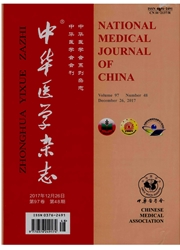

 中文摘要:
中文摘要:
目的应用与多囊肾病基因1(PKD1)和多囊肾病基因2(PKD2)紧密连锁的微卫星DNA进行家系连锁分析,研究中国上海市汉族该病的遗传异质性,并比较1型和2型常染色体显性多囊肾病(ADPKD)患者临床表现的差异.方法根据知情同意的原则,收集43个诊断明确的汉族ADPKD家系,利用聚合酶链反应扩增与PKD1和PKD2紧密连锁的微卫星DNA,对PCR扩增产物进行基因扫描分型和连锁分析,确定患病家系与PKD1或PKD2连锁.收集家系中所有患者(包括死亡个体)的病史,现有症状和超声检查结果,对两型患者的临床表现进行统计学比较.结果在进入研究的43个家系中,36个家系与PKD1连锁,占全部家系的84%,7个家系与PKD2连锁,占16%.1型和2型ADPKD患者的诊断平均年龄为36.8岁和46.3 岁,高血压的发生率和诊断平均年龄分别为62%、54%和37.4岁、49.1岁,终末期肾病(ESRD)的发生年龄为51.2岁和64.7岁.结论在上海市汉族中,约84%的ADPKD患者由PKD1突变所致,约16%的患者由PKD2突变所致.两型患者临床并发症发生率无明显差别.但1型患者与2型患者比较,其ADPKD诊断年龄、高血压诊断年龄和终末期肾病发生的平均年龄分别提早9.5年、11.7年和13.5年,这提示1型患者的预后较差.
 英文摘要:
英文摘要:
Objective To study the genetic heterogeneity of autosomal dominant polycystic kidney disease by linkage analysis with microsatellite DNA tightly linked to PKD1 and PKD2 in Shanghai Han nationality population and to compare the clinical presentation of ADPKD type 1 and 2. Methods 43 unrelated ADPKD families were included in this study after informed consent was obtained. Families were typed by using microsatellites for PKD1 and PKD2. Microsatellite DNA were amplified by polymerase chain reaction and studied by linkage analysis. The clinical history, symptoms, complications and records of ultrasound examination of patients of ADPKD type 1 and 2 were collected. The data were analyzed by medical statistics. Results In total families, 36 families showed to be linked to PKD1, which accounts to 84% of all families. 7 families linked to PKD2, which accounts to 16%. The diagnosis age of patients of ADPKD type 1 and type 2 is 36. 8 year and 46. 3 year, the frequency and diagnosis age of hypertension is 62%,54% and 37.4 year, 49.1 year, and the frequency of hepatic cysts, urinary-tract infection, macrohaematuria, urinary-tract calculi, cerebrovascular accident is 59% and 60% ,20% and 26% ,33% and 20% ,24% and 14% .13% and 7% , respectively, the onset age of ESRD is 51.2 year and 64.7 year. Conclusion The results in this study were similar to the ones of foreign reports. There is no significant difference of frequencies of complications between the patients of two types. But the diagnosis age of ADPKD and hypertension, the onset age of ESRD of patients of type 1 are earlier than that of type 2, which suggests that the prognosis of patients of type 2 is better than that of type 1.
 同期刊论文项目
同期刊论文项目
 同项目期刊论文
同项目期刊论文
 期刊信息
期刊信息
